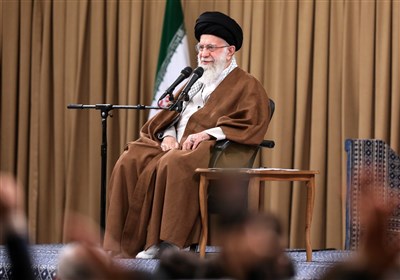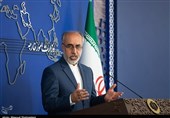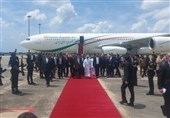Yemen Victim of UN’s Regime Change Policies: Swedish Rights Activist
TEHRAN (Tasnim) – A human rights activist from Sweden slammed the United Nations for backing the ongoing genocide committed by the Saudi regime in Yemen and said the Arabian Peninsula country is a victim of the regime change policies of the Western-dominated organization.
“The UN should be able to act (on Yemen) but is too much dominated by the modern form of British Empire, with its commonwealth members and the Western allies,” Ulf Sandmark said in an interview with the Tasnim News Agency.
“The UN has even backtracked on its Westphalian Peace conceptions of national sovereignty and adopted the Regime change agenda of Tony Blair so-called R2P,” he said, adding, “Yemen is a victim of the regime change policies.”
Ulf Sandmark is a Swedish economist and human rights activist as well as a longtime collaborator of American political figure Lyndon H. LaRouche. Sandmark is a board member of the Schiller Institute in Sweden and the Stockholm Correspondent for the Executive Intelligence Review (EIR). As a child, he lived for three years with his family in Addis Abeba and became active in Third world development issues at the time of his studies at the Stockholm School of Economics. He has written many articles and proposals for development programs, including "The Phoenix program - Discussion points for the reconstruction of Syria" (co-author Hussein Askary) about how to realize the major potential for recovery in linking up Syria to the New Silk Road. As a chairman for 20 years of the Anti-Drug Coalition in Sweden, he has written about how to dismantle the drug banks and their narco-terrorist bands. He has also delivered speeches at various international conferences, including a two-day conference held in London last year to “support the Yemeni people against the Anglo-American-Saudi imperial war”.
Following is the full text of the interview:
Tasnim: As a human rights activist, what do you think about the ongoing human tragedy in Yemen caused by the Saudi blockades on the country’s ports and airspace? The Red Cross has warned that cholera, a diarrheal disease that has been eradicated in most developed countries, could infect a million people in Yemen by the end of the year, according to media reports. Why have the international organizations, particularly the UN, remained passive in the face of the ongoing Saudi atrocities?
Sandmark: Thank you for the question. My point is that the International organizations have a too limited agenda to stop the war. Their agenda is to alleviate the suffering and describe what is going on. It is good as far as it can go, but what is needed are political actions, which could only be demanded from governments, politicians, political organizations and citizens acting politically. Such action needed action, we now, for example, see from the four US Congressmen forcing a vote in Congress against the US support of the war on Yemen.
The UN should be able to act but is too much dominated by the modern form of British Empire, with its commonwealth members and the Western allies. The UN has even backtracked on its Westphalian Peace conceptions of national sovereignty and adopted the Regime change agenda of Tony Blair so-called R2P. Yemen is a victim of the regime change policies. The formerly main warring Yemeni factions, the Ansarullah Movement and the party of the former president Ali Abdullah Saleh, in early spring 2015 had joined together to form an independent Yemeni national leadership, into which also other political parties joined. This new leadership of Yemen was outside the control of the Anglo-Americans and their puppet Saudi Arabia, who started the illegal war against Yemen to reverse that.
Tasnim: As you may know, airstrikes by the Saudi-led coalition have killed mostly Yemeni civilians, including thousands of women and children. A recent report authored by several international aid agencies said Yemen suffered more airstrikes in the first half of this year than in the whole of 2016, increasing the number of civilian deaths and forcing more people to flee their homes. In your opinion, why has the Saudi regime decided to increase the airstrikes, hitting civilian targets?
Sandmark: Militarily, the Saudi-led coalition is losing the war and cannot move their forces into Yemen without being repelled. They are only able to try to break the will of their enemy by attacking the population. However, there is more to this, as the Saudi air force attacks also the culture and heritage of Yemen. What we see are the same dark age forces destroying other nations in the region. The policy is not to conquer, but to block development and create lawless regions, which can be centers of destabilizations of the entire Eurasian continent. Like in the Idlib province in Syria where whole villages are taken over and used as training camps for terrorists from the minorities from Western China.
The British Empire is, as always, too weak to rule without other people as their tools. They do not have military forces, even with the help of the US, to take on nations like Iran, much less India, China or Russia. Their chosen option has been to foment internal destabilization among the hundreds of minorities of Eurasia, to block the emerging economic and political power of the BRICS and the Silk Road Initiative.
As Syria is about to reassert its sovereignty and even Somalia is approaching peace, there is an urgent need by the British troublemakers to tear down Yemen into a dark age region where terrorists can be trained, especially in such a strategic area between Africa and Asia, close to the maritime Silk Road.
Tasnim: Recently-leaked emails written by two former top US officials have shown that Saudi Arabia's crown prince and defense minister Mohammed bin Salman "wants out" of the war he started in Yemen. The Saudi regime has reached none of its objectives in Yemen. In 2015, the kingdom had a record budget deficit of almost $100 billion, prompting it to rein in public spending in a bid to save money. Why is the regime continuing its attacks on the Arabian Peninsula country despite its failures and cash-strapped economy? What do you think about the future of the war?
Sandmark: The Saudis were recruited by the British Empire in the 18th Century and elevated to rule in the style of the Maharajas of the East India Colonial rule. They are not allies, but just tools of the Empire. The young Salman evidently did not understand this and started a war that could destroy the rule of the Saudi family. Now he is locked in the war and cannot stop it. The British interest is to foment chaos, and clearly, do not stop him from destroying himself. In the meantime, they just rob the money from the Saudis, just as many others do.
The target of chaos in the Persian Gulf states are the great emerging Asian nations, especially China, who depend on the oil from there. Russia is depending on the oil price. As China and Russia, and their allies in Asia, are clearly threatened by chaos in the Persian Gulf, it limits their ability to stop the Yemen war. They try to bring the Saudis to a peace policy by inviting them into New Silk Road Initiative, but Salman canceled all Saudi infrastructure projects in the economic plan. What would solve the situation is to end British colonialism on the Arabian Peninsula and let their peoples create republics oriented to the development of their citizens.
In the meantime, the British and their evil geopolitics must be attacked and isolated. The responsibility for the creation of the greatest human catastrophe in the world just now must be put squarely on the shoulders of the British and their main allies US and France. The brutal war on Yemen must stop immediately. It is not allowed to use a UN Resolution to commit crimes against humanity.






